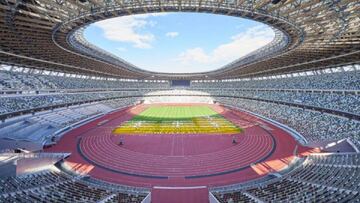Tokyo Olympics 2021 covid restrictions: can spectators go to stadiums?
What are the latest safety protocols for the foreign and domestic spectators on indoor and outdoor venues of the Olympic Games competitions in Japan.


After a lot of reconsideration, a joint decision was made by the Japanese Olympic organizers, the International Olympic Committee, the International Paralympic Committee, and the metropolitan government of Tokyo to ban the fans from Tokyo-area stadiums and arenas when the Olympics begin in two weeks.
Olympic Games news:
- When is the 2021 Tokyo Olympics opening ceremony taking place?
- In which disciplines has the USA never won an Olympic medal?
- How the best swimmer and Olympian of all times, along with the fastest man on Earth, created Olympic history
It will be a severe blow to Japanese taxpayers and local organizers of the games, already postponed from 2020 because of the coronavirus pandemic. The organizers will lose large sums of money in ticket revenue, which will have to be made up by the government of Japan.
The Olympic fans also went through months of uncertainty about whether the Olympics will go ahead. For them, the new situation means the Olympics will be a largely TV-only event after the Japanese government put the capital under a COVID-19 state of emergency because of rising new infections and the highly contagious delta variant. Foreign fans were banned months ago, and the new measures will mean no spectators in stadiums and arenas around Tokyo — both indoor and outdoor venues. The ban also covers Tokyo and three surrounding prefectures — Kanagawa, Saitama, and Chiba.
The state of emergency will commence on July 12 and runs through Aug. 22. The Olympics, which open July 23 and run through Aug. 8, fall entirely under the emergency period, while the Paralympics open Aug. 24.
Basically, the July 23 opening ceremony at the new $1.4 billion US National Stadium will be without paying fans. However, some dignitaries, stakeholder representatives, IOC officials, and others will be allowed to attend.
Related stories
One of the top government medical advisers urged the authorities to take strict measures quickly ahead of the Olympics, with summer vacations approaching, and repeatedly called for a spectator ban, calling it "abnormal" to stage an Olympics during a pandemic. Separately, a government advisory panel expressed concerns about the resurgence of infections, especially for having two-thirds of the infections in the capital region are from Tokyo, and their most significant concern is that there will be a spread of the infections to neighboring areas.
On the other side, the IOC is pushing ahead with the Games against most medical recommendations, in part because the postponement interrupted their income flow, which comes almost 75 percent from selling broadcast rights. Estimates suggest it would lose $3 billion to $4 billion if the Olympics were canceled altogether.

